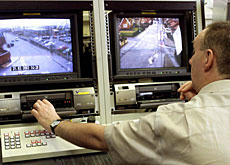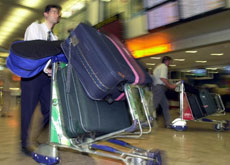Civil liberties pushed aside in war on terror

The suspension of many civil liberties as part of the United States war against terrorism has led to fears that the same could happen in Switzerland.
Justice and security experts meeting in Interlaken agree that individual freedoms are under threat like never before, but not all the blame can be pinned on Washington.
European Union airlines began on Wednesday to hand over to the US authorities detailed information on passengers flying to the US (see related story).
Switzerland’s national carrier, Swiss, has not yet followed suit but is expected to do so.
Against the rules
“That [US demand] goes very far and is a serious problem because it goes against all the rules of data protection,” Mark Pieth, professor of law and criminology at Basel University told swissinfo.
Pieth is a guest speaker at the three-day international criminology conference in Interlaken, which ends on Friday.
It was called to address the main issue facing democratic nations at present: how to ensure security while respecting civil liberties guaranteed by law.
Since the terrorist attacks on New York and Washington one and a half years ago, European nations have been under pressure to assist Washington in its war against terrorism.
That pressure has led to situations such as the current one affecting air travel to the US.
Tighter legislation
However, Pieth said that Switzerland has if anything tightened legislation since that time to ensure the privacy of the individual.
A new law on telecommunications, which came into effect a little over a year ago, restricts wiretapping and the monitoring of emails to people suspected of serious crimes.
The legislation includes a list of offences deemed serious enough to permit wiretapping. Included are money laundering, terrorism, and corporate crime.
“In the past, wiretapping was used for relatively minor forms of criminality and that is what we want to do away with [through the law],” Pieth said.
Smart software
He admits though that legislation can do little to stem advances in information technology, which make electronic eavesdropping child’s play.
This could be a greater danger to civil liberties.
Pieth points out that Switzerland now has about 6,000 cases of wiretapping a year, a six-fold increase over the past decade, which he puts down to easy-to-use systems.
And a forensic computing expert told the conference that inexpensive software now on the market has capabilities beyond those law enforcement agencies are legally allowed to use.
Herbert Andres said while the police are restricted to monitoring emails, the smart software could detect websites visited, keyboard specifications and computer screen contents.
Video surveillance
Another worrying trend is the increase in the number of video surveillance cameras installed in public and private areas in Switzerland.
Some reports say about 100 cameras watch every move of passengers and passers-by at and around Zurich’s railway station.
Zurich city council has approved the limited use of cameras in crime-afflicted areas, and Bern is considering the same, although Swiss law stipulates that a citizen has a right to privacy even in public places.
But the use of these cameras may be counterproductive, according to research presented at the conference.
Dominique Pécaud from France’s Man and Technology Institute said the study produced no evidence that cameras aided crime prevention.
He said it did however reveal an adverse affect: that their presence led to greater anxiety among the people living or working in the monitored areas instead of making them feel safer.
Pieth said if the technology was available, it would be used. The question was whether the checks and balances in place were sufficient to prevent abuse.
“That’s the real issue we are discussing here at the conference,” he concluded.
swissinfo, Dale Bechtel
The conference is sponsored by the Swiss Group on Criminology and is held annually in Interlaken.
The conference is sponsored by the Swiss Group on Criminology and is held annually in Interlaken.
This year’s theme is “More security – less freedom?”
Experts discussed the controversial use of surveillance cameras, a new law on wiretapping and Internet monitoring, criminal profiles and DNA analyses.

In compliance with the JTI standards
More: SWI swissinfo.ch certified by the Journalism Trust Initiative


You can find an overview of ongoing debates with our journalists here. Please join us!
If you want to start a conversation about a topic raised in this article or want to report factual errors, email us at english@swissinfo.ch.